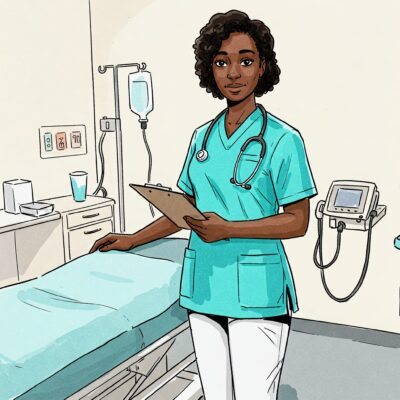Clinical officers provide primary healthcare services, including diagnosing and treating common illnesses, performing minor surgeries, and managing patients in hospitals and clinics.
What is a typical day as a Clinical Officer?
– Examining patients and diagnosing medical conditions
– Prescribing treatments, medications, and therapies for illnesses and injuries
– Performing minor surgical procedures, such as wound suturing or abscess drainage
– Monitoring patient recovery and providing follow-up care.
What else might they be expected to do?
– Collaborate with doctors and nurses in healthcare teams to manage complex cases
– Educate patients on disease prevention, lifestyle changes, and medication adherence
– Conduct outreach programs or mobile clinics in underserved areas
– Assist in managing medical records and ensuring compliance with healthcare regulations
What type of training is needed for this career path?
– A Diploma in Clinical Medicine from a recognized institution like KMTC is the minimum requirement.
– A BSc in Clinical Medicine allows for greater specialization and access to leadership roles.
– Licensing by the Clinical Officers Council of Kenya is mandatory to practice.
What kind of personality is needed to excel in this career path?
– Compassionate, detail-oriented, and resourceful individuals excel in this role.
– BBig 5 traits: Conscientiousness and Agreeableness.
– Myers-Briggs types: ISFJ or ISTJ align well with this career.
What kind of interests do people in this career path have?
What challenges can I expect to face if I pursue this career path?
– Managing high patient loads, especially in rural or underserved areas
– Navigating resource limitations in public healthcare facilities
– Addressing patients’ cultural and financial barriers to accessing care
What are the job prospects for this path in Kenya and Africa? What about International prospects for a Kenyan citizen?
– Kenya and Africa: High demand due to shortages of healthcare professionals, particularly in rural areas. Opportunities exist in public health facilities, private hospitals, and NGOs.
– International: Limited direct opportunities, but further qualifications can open roles abroad. Some global health organizations may recruit experienced clinical officers for fieldwork.
What should I focus on if I choose to pursue this career?
– Build expertise in primary care, minor surgical procedures, and patient education.
– Pursue additional certifications in specialized areas like emergency care, pediatrics, or infectious diseases.
– Develop strong interpersonal skills to connect effectively with patients and healthcare teams.
Which other careers or job roles can I progress to?
– Specialist Clinical Officer in areas like cardiology or dermatology (with further training)
– Public Health Officer
– Hospital Administrator
– Lecturer or Trainer in Clinical Medicine

